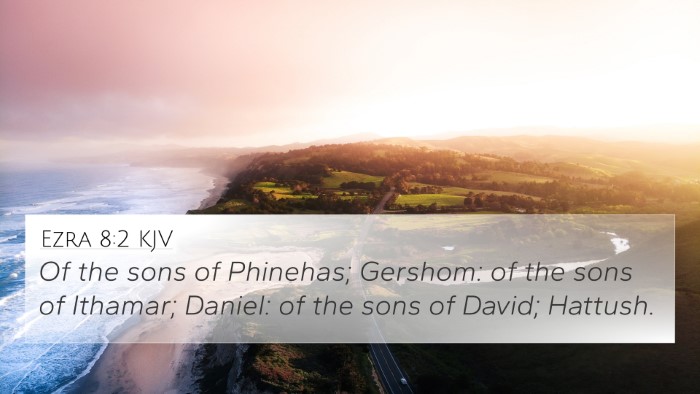Understanding 1 Chronicles 3:22
Verse: "The sons of Jeconiah; Assir, Salathiel his son." (1 Chronicles 3:22)
Overview
This verse is part of the genealogy recorded in 1 Chronicles, a book that emphasizes the heritage of Israel. The lineage outlined here connects the post-exilic community back to the Davidic line, showcasing the fulfillment of God's promises concerning the house of David.
Verse Meaning and Commentary
Matthew Henry notes that genealogies serve significant purposes in the biblical narrative. They establish the rightful claim to the throne, particularly for the Messiah. The mention of Jeconiah is particularly important as it marks a pivotal moment in Israel's history—the Babylonian exile and its implications for God's covenant with David.
Albert Barnes highlights the significance of the names listed in this genealogy. Assir and Salathiel are ancestors of Jesus Christ, which ties the New Testament's fulfillment of prophecy back to these ancestral lines. Salathiel, in particular, is recognized as a key figure in the restoration of the Jewish community after exile.
Adam Clarke emphasizes the notion of the "root of David." He explains that these genealogies signify God's loyalty to His promises. The royal line, though interrupted by exile, eventually leads to Jesus, reinforcing the theme of redemption throughout scripture.
Bible Verse Cross-References
- Matthew 1:12 - This verse directly connects with the genealogy of Jesus, showing the lineage stemming from Jeconiah.
- Jeremiah 22:30 - Highlights the curse placed on Jeconiah, underscoring the complexity of lineage and prophecy.
- Luke 3:27 - Provides an alternative genealogy linking back to David through Nathan, showcasing different lines from the same lineage.
- Haggai 2:23 - Reaffirms God's promise to Zerubbabel, a descendant of Jeconiah, emphasizing the continuity of God's plan.
- Revelation 22:16 - Where Jesus declares Himself as the root and offspring of David, thus fulfilling the Messianic prophecy.
- 1 Kings 10:1-2 - The historical context of the Davidic line and its implications in royal lineage.
- Romans 1:3 - Confirms that Jesus was descended from David according to the flesh, bridging Old Testament prophecies with New Testament fulfillment.
Thematic Connections
The genealogy in 1 Chronicles serves as a reminder of the covenantal faithfulness of God throughout the generations. The themes of restoration, royalty, and redemption echo throughout scripture, connecting the Old and New Testaments.
Linking Bible Scriptures
- Covenant Promises - Genesis 17:7-8 discusses God's everlasting covenant with Abraham, leading to the establishment of the Davidic line.
- God's Sovereignty - Romans 8:28 reflects God's control over history, including the rise and fall of kings.
- Exile and Return - Isaiah 44:28 speaks of Cyrus, who would facilitate the return of the Jewish people.
Comparative Bible Verse Analysis
By exploring the connections between these verses, readers can discern a greater narrative at work. The inter-Biblical dialogue between the Old and New Testament unveils the progressive revelation of God's plan for humanity. The genealogy found in 1 Chronicles illuminates the significance of familial lines in understanding the overall message of redemption throughout the Bible.
Conclusion
In conclusion, 1 Chronicles 3:22 serves as a critical juncture in understanding the entirety of God's plan as revealed through scripture. The lineage of Jeconiah, Assir, and Salathiel showcases God's unwavering faithfulness and sets the stage for the redemptive work of Christ.



